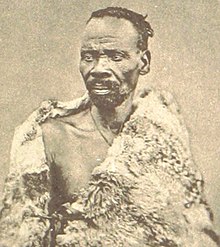Sekhukhune
Sekhukhune (* 1814 ; † August 13, 1882 ; also Sekukuni or Sikukuni ) was a traditional ruler of the Bapedi (also Marota ) in the north of what is now South Africa . He long resisted the settlers of European descent.
Life
Sekhukhune grew up as the son of the ruler Sekwati. His father died in September 1861. Sekhukhune ousted his rightful successor, his half-brother Mampuru, and became ruler. He resided on the fortress-like mountain Thaba Mosega (roughly: "Kampfberg") on the east side of the Lulu Mountains, southeast of today's city of Polokwane . By marrying women from neighboring groups, he consolidated his supremacy in the north of the area between the rivers Vaal and Limpopo . He sent men to the mines and farms in the white settlements and levied high taxes, which he used to buy firearms in Delagoa Bay .
His father had already beaten back the Boer Voortrekker under Andries Hendrik Potgieter in 1838 and around 1850 . The missionary Alexander Merensky (1837-1917) from the Berlin Mission Society lived in the Bapedi area . When it became clear that he was on the Boers' side, Sekhukhune had him expelled. In 1876 an army of the Boer South African Republic and allied Swazi Sekhukhune attacked and was repulsed. The Boer President Thomas François Burgers then had to resign and was replaced by Paul Kruger . A mercenary force under the German Conrad Hans von Schlieckmann was also defeated in the same year.
In 1877 the British annexed the South African Republic, including the Bapedi area, among other things because Sekhukhune was a threat to the South African Republic and thus to the stability of the region. Another mission to pacify Sekhukhune in 1878 failed again. It was not until 1879 that a large force consisting of the British, Boers and around 10,000 Swazi defeated him. He was imprisoned in Pretoria . Merensky received land from the Boers as a reward. As a result of the First Boer War , the Pretoria Convention was closed. Article 23 of that peace treaty ordered the release of Sekhukhune. However, he could no longer return to Thaba Mosega, but had to settle near the mountain. In 1882 he was murdered by his half-brother Mampuru.
aftermath
An obituary for Sekhukhune was published in the London Times , in which his successful resistance against the Boers was recognized. After his death, his territory was divided into small units led by - powerless - native commissioners .
The Sekhukhune district in Limpopo Province has been named after him since 2000; the area is also known as Sekukuniland .
Web links
- Portrait at sahistory.org.za (English)
- Description of the "Sekhukhune Wars" at samilitaryhistory.org (English)
Individual evidence
- ↑ a b c d e f portrait at sahistory.org.za (English), accessed on July 7, 2014
- ↑ Report at sahistory.org.za (English), accessed on July 8, 2014
| personal data | |
|---|---|
| SURNAME | Sekhukhune |
| ALTERNATIVE NAMES | Sekukuni |
| BRIEF DESCRIPTION | Ruler of the Bapedi |
| DATE OF BIRTH | 1814 |
| DATE OF DEATH | August 13, 1882 |
